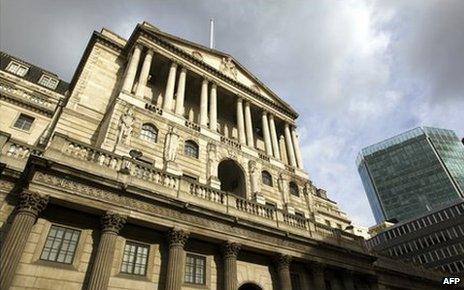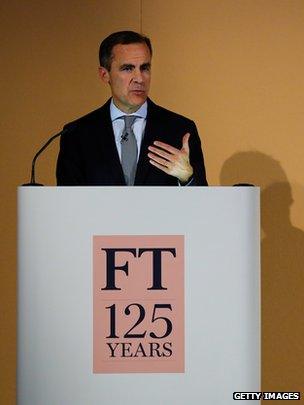Carney's faith in the City
- Published
- comments

At dawn this morning, Mark Carney made good on one of the promises he made in an era-defining speech last week that reconstructed the Bank of England's relationship with the City of London.
The Bank, and the central banks of Canada (Carney's alma mater), Japan, the US, the eurozone and Switzerland, announced that their temporary arrangements to lend their respective currencies to each other would be made permanent (as so-called "standing arrangements").
Why does it matter?
Well it is an attempt to ensure there are fewer hiccups and bumps for international banks that are the big players in global financial capitalism. It means, for example, that if a bank is in desperate need of an emergency yen loan after Tokyo is closed, or if it want dollars in a hurry while New York sleeps, it can go to the Bank of England for Japanese or US liquidity.
These so-called "swap" arrangements were originally put in place during the 2007-8 financial crisis, on a temporary basis, when global markets seized up - and we all became acutely aware for the first time in a generation that the ability of central banks to create money and make emergency loans to commercial banks is perhaps the most important bulwark against economic meltdown in extremis.
The swap arrangements recognised that financial centres like London are homes to banks that never sleep and which deal in every currency imaginable: it would have been (and is) as lethal for a British bank to run out of dollars to repay creditors, as to have been short of sterling.
Making the swap arrangements more than a stopgap, turning them into a permanent feature of the financial system, is a powerful signal by the central banks that the new global financial system created from the 1970s onwards - of unlimited sums in whatever currency flowing across borders - is a reality they don't envisage changing or wish to change.
Now it is true that in the aftermath of the 2008 crisis, banks reined in their cross border lending. This repatriation of banking happened partly because all banks were under pressure from regulators to shrink their balance sheets, and the easiest way to do this without being slaughtered by politicians was to withdraw from markets away from their respective homes (and the eurozone crisis was a second spur to return to base).
But the central banks are today signalling that they see this modest retreat from global financial capitalism as a temporary phenomenon.

Perhaps more importantly, the tenor of Mr Carney's speech last week to mark the FT 125th birthday was that the balkanisation of finance was not only temporary but a very bad thing - for London.
He used a rhetoric about how valuable big international banking can be to the prosperity of the UK that not even the pro-City Chancellor of the Exchequer has felt able to deploy since the debacle of five years ago.
The last time we heard this sort of language from a pillar of the British establishment was probably when Gordon Brown declaimed at the annual Mansion House speech in June 2007 - weeks before it all went Pete Tong - that we were seeing "an era that history will record as the beginning of a new golden age for the City of London".
Brown has since changed his tune. And doubts about the wisdom of London being host to banks whose loans were equivalent to five times the size of the British economy, and are still 400% of GDP, subsequently characterised policymaking by the Bank of England, the now-defunct Financial Services Authority and the Treasury.
But apparently Carney does not believe that size matters in that sense.
Here is the most important section of his recent speech (and apologies for quoting at some length, but this stuff matters).
"Suppose, for example, that UK-owned banks' share of global banking activity remains the same and that financial deepening in foreign economies increases in line with historical norms. By 2050, UK banks' assets could exceed nine times GDP, and that is to say nothing of the potentially rapid growth of foreign banking and shadow banking based in London.
"Some would react to this prospect with horror. They would prefer that the UK financial services industry be slimmed down if not shut down. In the aftermath of the crisis, such sentiments have gone largely unchallenged.
"But, if organised properly, a vibrant financial sector brings substantial benefits".
Here for me is the heart of Carney's philosophy:
"It is not for the Bank of England to decide how big the financial sector should be. Our job is to ensure that it is safe. The UK can host a large and expanding financial sector safely, if we implement a reform agenda that extends well beyond domestic banking."
Now there are two very big and separate questions begged in this return to the idea that a City big in global banking is a good City.
First is a practical question - whether it is true that enormous banks can be made safe banks.
To cite just one very current concern, and as Mr Carney would concede, we are a very long way from having in place robust global rules to allow bust big international banks to be broken up and "resolved" (to use the jargon) in a way that forces the costs on their institutional and well-heeled creditors rather than on taxpayers.
We have not solved the problem of giant banks being too big to be allowed to fail - and, in a world where most of the countries of the rich west including the UK are at the limits of what they can borrow, big banks in practice may well right now be too big and expensive to save.
In other words, giant banks remain potential weapons of mass economic destruction. It is possible they can be made safe, defused, forever. But it hasn't happened yet.
However there is also an enormous ideological issue which Mr Carney's address implies - amazingly perhaps - has been resolved, with a whimper rather than a bang.
In the immediate aftermath of the crash and during the subsequent Great Recession, there was a lively debate about whether the UK had become too dependent on the City.
There were two concerns raised: whether it was good for the happiness and cohesion of Britain to be so dependent on an industry where huge disproportionate rewards go to small numbers of individuals, significantly widening the gap between rich and poor; and whether the British economy would be more stable and reliable as a wealth generator if it was less reliant on debt-fuelled growth and more reliant on manufacturing and tradeable services other than finance.
Mr Carney's appointment and his subsequent testament of faith in the City implies that the government has more-or-less given up on a fundamental rebalancing and reconstruction of the British economy away from banking.
And given that there hasn't been any conspicuous challenge to the Carney thesis from the Labour opposition, the assumption has to be that what used to known as the Establishment has returned to the comforting conviction that the City is golden-egg laying goose, and not a Trojan Horse.
If so, this is perhaps remarkable, in the wake of the biggest squeeze on living standards since the 1930s. There was a time, not that long ago, when thousands of people in London and New York manifested their distaste for bankers' conduct by creating tent cities. They presumably had confidence in our ability to alter our economic destiny.
Mr Carney, per contra, and by implication the UK's big political parties, have a more limited ambition: to sanitize the financial status quo, but not to replace it.